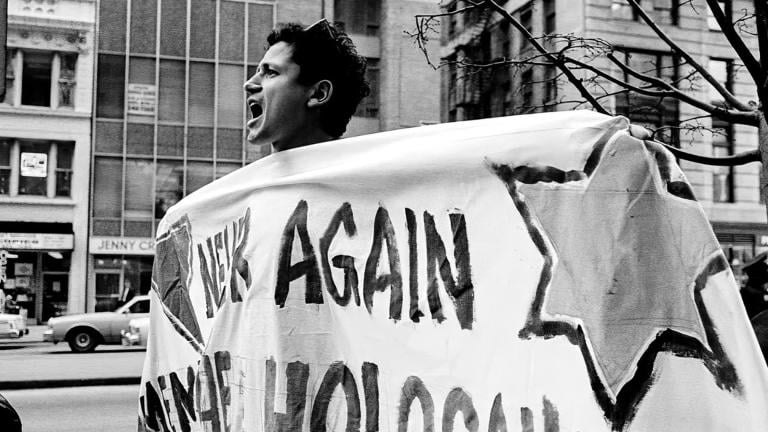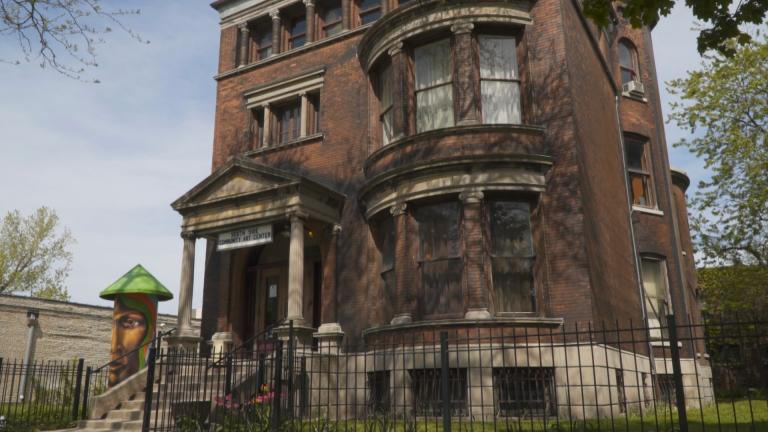In 1950, novelist Nelson Algren was on top of the world. His novel "The Man With the Golden Arm" won the first National Book Award and his critical reputation was high. The subject matter of the book, the life of Frankie Machine, a Polish-American card dealer with a major heroin habit, ensured that every civic organization in the city condemned the book, and major bookstores wouldn't carry it. That in itself was an accomplishment. By the time Algren died in 1981, he was next to forgotten, self-exiled from the city that he claimed didn't have his books in its libraries.
"Algren," a new documentary by Chicago filmmaker Michael Caplan, premieres at this year’s Chicago International Film Festival. Through interviews with Algren's associates such as photographer Art Shay, Hollywood directors Andrew Davis, Philip Kaufman and William Friedkin, writer Denise DeClue, playwright Joe Pintauro, journalist Rick Kogan, Algren scholars including Bill Savage, and admirers including rock musicians Billy Corgan and Wayne Kramer, filmmaker and writer Stephen Elliot, Caplan explores Algren's art, his life and career frustrations, including his love affair with French author Simone di Beauvoir, and his ongoing influence and importance to a generation far removed from the post-war immigrant neighborhoods of Chicago before the building boom of the 1950s.
The documentary, “Algren: The Poet of the Neon Wilderness,” made its world premiere at the Chicago International Film Festival on Tuesday, Oct. 14. Additional screenings will be held on Monday, Oct. 20, and Tuesday, Oct. 21, at the film festival.
On Saturday, Oct. 18, Caplan will participate in the “Shooting in Chicago” panel at 11:00 an at the AMC River East, located at 322 E. Illinois St. Caplan will join shorts directors Kris Swanberg (“Baby Mary”), Meghann Artes (“Speed Dating”), Hayoung Jeon (“Frame Walk”), Zoe Lubeck (“Lucy”), and producer and actor Grace McPhillips (“The Other One”), in discussing filmmaking in the city.
Caplan’s documentary isn’t the only one about the Chicago writer. Read an article about the other documentary on Algren below.
Watch a trailer of “Algren: The Poet of the Neon Wilderness.”
 “Nelson Algren: The End Is Nothing, the Road is All,” is the other documentary about Algren that has yet to be screened (a sneak preview was held Oct. 3 for supporters of the film). The documentary was produced and directed by Denis Mueller, Ilko Davidov, and Mark Blottner. Blottner began working on the documentary more than 20 years ago, but delayed finishing the film because of financial issues.
“Nelson Algren: The End Is Nothing, the Road is All,” is the other documentary about Algren that has yet to be screened (a sneak preview was held Oct. 3 for supporters of the film). The documentary was produced and directed by Denis Mueller, Ilko Davidov, and Mark Blottner. Blottner began working on the documentary more than 20 years ago, but delayed finishing the film because of financial issues.
In 2012, Blottner enlisted the help of Mueller, who enlisted the help of Davidov. All three had worked together previously and had all worked on films about writers, according to Mueller.
After agreeing to help with the documentary, Mueller began reviewing interviews that he and Blottner had previously shot.
“Then I saw the Studs Terkel interview and the one with Kurt Vonnegut. It resonated with me that this is more valuable than when it was shot in the '90s, for the obvious reason,” Mueller said. “I saw the old interviews and said, ‘this could be special.’ We could have people talk about Algren from knowing him. It wasn’t casually knowing him. Studs was one of the few friends Nelson didn’t break off from… It’s nice to have writers talking about writing.”
In addition to reviewing the older interviews, Mueller and his fellow co-directors began interviewing others, including Algren scholars, an expert who knew a lot about the blacklist of the ‘40s and ‘50s, and Algren’s former agent, Clancy Sigal.
“What we did was fill in some gaps,” Mueller said of the additional interviews which were completed mid-2012. Mueller began editing the film “right away” once interviews were completed. The group wanted a film noir look for the documentary.
“We looked for archival footage, and found some amazing stuff,” Mueller said. “Some gritty stuff shot by Tom Palazzolo… We got [footage to have] the earthy feeling of Algren’s story.”
The film follows Algren’s life chronologically beginning with Algren’s graduation from the University of Illinois in 1929 unable to find work.
“As he says in the film, ‘I never entered the world of pimps and thieves voluntarily. I was pushed into it,’” Mueller said. “We followed [his life] in chronological order and concentrate mostly on the ‘40s and ‘50s. That’s the time when Nelson was a top writer in America. That’s when it was oppressive, when he was having his affair with Simone de Beauvoir, and the time the FBI wouldn’t let him get a passport.”
Watch a preview of the film.
Mueller hasn’t seen the entire documentary about Algren by Caplan, but said he’s seen “bits and pieces,” and heard about it from friends.
“The basic difference [between these documentaries] is ours is the film about the artist and biography,” Mueller said. “I think the other film is more about Nelson as a writer and how he has influenced people in his life. From what I’ve seen, it’s more about his influence.”
Caplan’s film premiered at the Chicago International Film Fest on Oct. 14, less than two weeks after Mueller’s film hosted a sneak preview. When asked about the timing of the showings of the two documentaries, Mueller said it was a coincidence.
“It’s just happenstance,” he said. “Quite frankly, we never really talked. We knew each other were out there and were aware of the differences. We finished [our films] about the same time. Actually, our progress in 2012 had to do with the grants that helped us and the money we raised on Indiegogo… It allowed us to get on a roll and finish it.”








